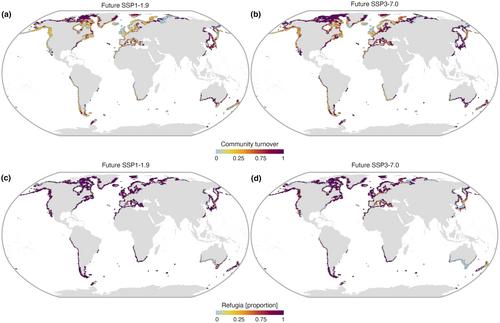Future climate change threatens marine forests across the world, potentially disrupting ecosystem function and services. Nonetheless, the direction and intensity of climate-induced changes in kelp forest biodiversity remain unknown, precluding well-informed conservation and management practices.
Global.
We use machine-learning models to forecast global changes in species richness and community composition of 105 kelp forest species under contrasting Shared Socioeconomic Pathway (SSP) scenarios of climate change (decade 2090–2100): one aligned with the Paris Agreement and another of substantially higher emissions.
A poleward and depth shift in species distributions is forecasted, translating into ~15% less area in the extent of the global biome, coupled with marked regional biodiversity changes. Community composition changes are mostly projected in the Arctic, the Northern Pacific and Atlantic, and Australasia, owing to poleward range expansions and wide low latitude losses.
By surpassing the Paris Agreement expectations, species reshuffling may simplify and impair ecosystem services in numerous temperate regions of Australasia, Southern Africa, Southern America and the Northern Atlantic, and in the tropical Pacific, where complete species losses were projected without replacement. These estimates, flagging threatened regions and species, as well as refugial areas of population persistence, can now inform conservation, management and restoration practices considering future climate change.



